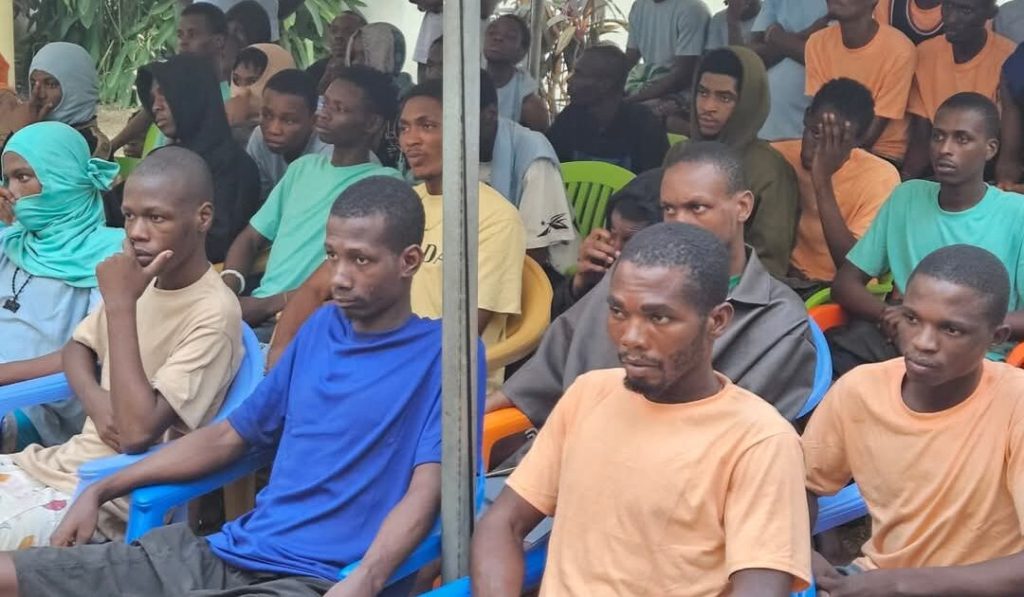The repatriation of 231 Nigerian children and young adults from Ghana marks a significant victory against human trafficking. This complex operation, spearheaded by the Nigerians in Diaspora Commission (NiDCOM), involved collaboration with multiple agencies, including Wema Bank, the Office of the First Lady, Senator Oluremi Tinubu, the Nigerian High Commission in Ghana, and the Ghanaian authorities, specifically the Economic and Organised Crime Office (EOCO). The successful return of these victims underscores the importance of international cooperation and the commitment of both Nigerian and Ghanaian authorities to combatting this heinous crime. The victims, aged between 15 and 38, hailed from various Nigerian states, highlighting the widespread nature of this issue. Their ordeal involved being lured to Ghana under false pretenses, only to be trapped in exploitative conditions, primarily forced into cybercrime activities.
The victims’ experiences paint a grim picture of modern-day slavery. Confined to cramped quarters, they were forced to participate in cybercriminal activities, enduring abuse and threats if they failed to meet imposed targets. The reported case of a victim suffering broken legs for failing to remit illicit earnings underscores the brutality these trafficked individuals faced. This incident serves as a stark reminder of the dehumanizing nature of human trafficking and the urgent need for continued efforts to combat it. The repatriation effort itself was the culmination of months of negotiations and collaboration between Nigerian and Ghanaian authorities. The Nigerian High Commission in Ghana, alongside NiDCOM and Chief Callistus Elozieuwa of Rescue Live Foundation International/NIDO Ghana, played crucial roles in securing the release of the victims.
Upon their arrival in Nigeria, the returnees underwent profiling by the National Agency for the Prohibition of Trafficking in Persons (NAPTIP). This process is essential for understanding the individual circumstances of each victim, assessing their needs, and ensuring they receive appropriate support. Following profiling, the victims were handed over to their respective state governments, marking the beginning of their reintegration process. This critical phase involves providing them with the necessary resources and support to rebuild their lives, including access to psychological counseling, vocational training, and educational opportunities. The ultimate goal is to empower them to become self-sufficient and prevent them from falling prey to traffickers again. The success of this reintegration process is vital for ensuring the long-term well-being of the returnees.
The collaboration between Nigerian and Ghanaian authorities, particularly the EOCO’s effectiveness in handling the case and caring for the Nigerian citizens while in their custody, exemplifies the importance of cross-border cooperation in combating transnational crimes like human trafficking. This joint effort demonstrates a shared commitment to protecting vulnerable individuals and bringing perpetrators to justice. The rescue operation was not an isolated incident; it followed the recent rescue of another 219 Nigerian victims by Ghanaian authorities, who uncovered a human trafficking ring operating in Accra. This indicates a growing trend of Nigerian citizens being trafficked to Ghana, highlighting the need for increased vigilance and proactive measures to prevent future cases.
The Nigerian government’s response to this crisis has been multifaceted. Beyond the immediate rescue and repatriation efforts, there’s a strong emphasis on preventive measures. The warning issued by Ambassador Bianca Odumegwu-Ojukwu, Nigeria’s Minister of State for Foreign Affairs, during her visit to Ghana’s EOCO, serves as a crucial message to Nigerian youths. Her caution against falling for false job offers abroad, which are often used as lures by trafficking rings, underscores the importance of public awareness campaigns in combating this crime. Educating potential victims about the dangers of these deceptive offers is essential in preventing them from falling into the traps set by traffickers.
This incident underscores the complex challenges posed by human trafficking and the need for a comprehensive approach involving prevention, rescue, prosecution, and reintegration. The Nigerian government’s efforts, in collaboration with international partners and NGOs, represent a crucial step in the fight against this global scourge. However, the fight is far from over. Continued vigilance, proactive measures, and international cooperation are essential to dismantling trafficking networks, protecting vulnerable individuals, and bringing perpetrators to justice. The successful repatriation of these 231 Nigerians offers a glimmer of hope, but it also serves as a reminder of the ongoing battle against human trafficking and the urgent need for continued and strengthened efforts to eradicate this crime.














